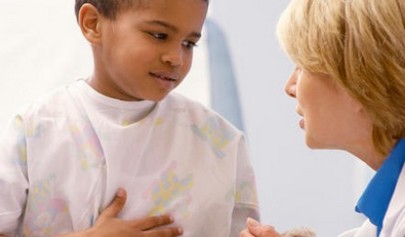Stomach Flu

Contents:
- How Do You Get Stomach Flu?
- Causes of Stomach Flu
- Signs and Symptoms of Stomach Flu in Babies
- Treatment of Stomach Flu in Children
- Prevention of Stomach Flu in Babies
- Why is the Stomach Flu So Dangerous?
- Will Influenza Vaccine Help in Case of Stomach Flu?
Stomach Flu in Babies
Stomach flu is an acute infectious disease caused by rotavirus (Rotavirus), characterized by lesions of the gastrointestinal tract. The source of infection is a healthy carrier of a virus or a sick person. The main route of transmission of rotavirus is fecal-oral. Infection occurs through contaminated food, water, rarely — through objects.
Rotavirus are highly resistant to the adverse external factors of the environment, to freezing, can withstand heat up to 60 °C. In fecal masses they may remain viable for 6-7 months. In the household and in the air, the virus remains 5-8 days. About 40 % of adults are temporary or permanent carriers of the rotavirus. They do not have the symptoms of the disease, therefore, non-compliance with the basic rules of hygiene, the probability of infection of toddlers and infants is very high.
Stomach flu is most often diagnosed in children in winter. This is usually the children from 6 months to 3 years. To 4 years almost 90 % of babies have sustained immunity to rotavirus. Schoolchildren and adolescents almost do not have stomach flu.
How Do You Get Stomach Flu?
Stomach flu. The easiest way to avoid catching stomach flu -wash hands thoroughly. Virus enters the human body through the mucous membrane of the gastrointestinal tract. The incubation period of this disease is from 16 hours to up to five days. The speed of development and the severity of the stomach flu depends on the concentration of the activator, penetrating the body and the condition of the human immune system.
One type of transmission of infection is the food. That is, the infection enters the body through unwashed fruits, vegetables, low-quality dairy products. Stomach flu can rightly be called the "disease of dirty hands". The contamination is also possible through boiled tap water, even during an ordinary bathing.
The second way of infection is airborne. At a loud conversation, sneeze, cough microbes from sick person spread in the air. The contact-household method of transmission of the pathogen is not excluded, especially in crowded places, in offices, in kindergartens, in schools, in shops.
Causes of Stomach Flu

Stomach flu at a child may occur as a result of eating unwashed fruit, vegetables, contaminated water, milk, underdone meat. Also infection can occur when non-complying the rules of hygiene (wash hands after streets, before eating) and rules when cooking food, for example, when slicing meats, breads, salads, one cutting board is used.
Symptoms of Stomach Flu at Children
The stomach flu at a child begins to occur a day after infection.
The symptoms of the disease are the following:
- increased body temperature to 38-39 °C;
- nausea and multiple vomiting, (up to 10-15 times a day);
- multiple loose stools up to 10-15 times a day (the color of fecal masses may change, you may see streaks of blood);
- abdominal pain of varying intensity;
- signs of colds (sore throat, runny nose);
- loss of appetite, weakness.
The above symptoms are typical for many other diseases, so it is very important for the child to see a doctor. In addition, stomach flu in children can lead to dehydration in the body (loss of fluids and minerals), which is extremely dangerous for life.
Characteristic signs of dehydration:
- lack of urination for more than 6-8 hours;
- dark urine with a pungent smell;
- weakness;
- lack of tears when crying;
- dry lips and oral cavity;
- constant feeling of thirst.
Generally, the treatment of the stomach flu in children of pre-school age is spent in a hospital. With adequate and timely treatment of the disease, it recedes in 5 days.
Treatment, How Should I Treat Stomach Flu?

At the moment there are no drugs against stomach flu. Treatment is aimed at restoring in the body of water-salt balance caused by profuse diarrhea and vomiting. The child is given much to drink (compote of dried fruits, tea, boiled water) in small portions. If the vomiting doesn't stop, then the child should drink every 10 minutes on a tea spoon. You can use the drug "Regidron", but only after consultation with a physician. The drug will help fill in the body the loss of minerals and glucose. To accelerate the excretion of harmful substances from the body it is possible to use sorbents ("Enterosgel", "Smecta", "Activated Carbon").
When the body temperature rises above 38.5 °C the child is given an anti-fever. It is important to observe the dietary regimen. The child requires a sparing diet, excluding fatty, fried, spicy dishes, dairy products, juices and carbonated beverages. It is recommended to give him porridge, cooked in water, broth. If a child refuses to eat, do not force him, but it's important that he should drink much liquid.
If the baby is breastfed, you should not stop the feeding. The babe should be breastfed as frequently as possible. Thus he will receive antibodies from the mother and compensate for the loss of liquids. A child should be given bed rest and isolation from healthy people. In the treatment of stomach flu in children antibiotics are not used, because they are ineffective against viruses.
Prevention, How Can I Help Protect My Baby Against Gastroenteritis?
The vaccine and specific methods of prevention of rotavirus do not exist.
To reduce the chance of infection, it is necessary to observe the following measures:
- to comply with the rules of hygiene (washing hands regularly throughout the day, especially after visiting public places);
- monitor the shelf life of dairy products;
- thoroughly wash fruits and vegetables;
- give to drink to the child only quality water (bottled, boiled);
- to prevent the kid taking the dirty hands in his mouths;
- when caring for a baby you should wash your hands frequently, especially after visiting streets and toilets;
- when bathing baby in the pool and pond to prevent ingestion of water.
Stomach flu in children is an insidious disease, leading to a dangerous complication – dehydration. Therefore, you cannot let everything take its course. The child requires adequate and timely treatment involving doctors.
Why is the Stomach Flu so Dangerous?
Rotavirus is dangerous for the child because it leads to dehydration. It can occur within a few hours after the first symptoms of the disease. The kid due to vomiting and frequent diarrhea very quickly loses water and minerals (potassium salts, chlorine, sodium). The condition of a sick child rapidly worsens.
Th dehydration affects the nervous system of a child. He begins to suffer convulsions. They can result in respiratory failure. The dehydration also affects the lungs. The child may develop pneumonia. This is a typical complication of a stomach flu. Another danger of dehydration during rotavirus infection is the loss of potassium, which leads to disruption of the work of the cardiovascular system.
Will Influenza Vaccine Help in Case of Stomach Flu?
You shouldn’t mix these diseases. These are two different diseases that have different causative agents. Of course, some symptoms may coincide. For example, head ache, general intoxication of the organism, aches in joints and temperature. However, influenza doesn’t cause a severe stomach indigestion. Influenza vaccine won’t protect your kid from getting ill with rotaviral infections.
Video: How to Treat the Stomach Flu